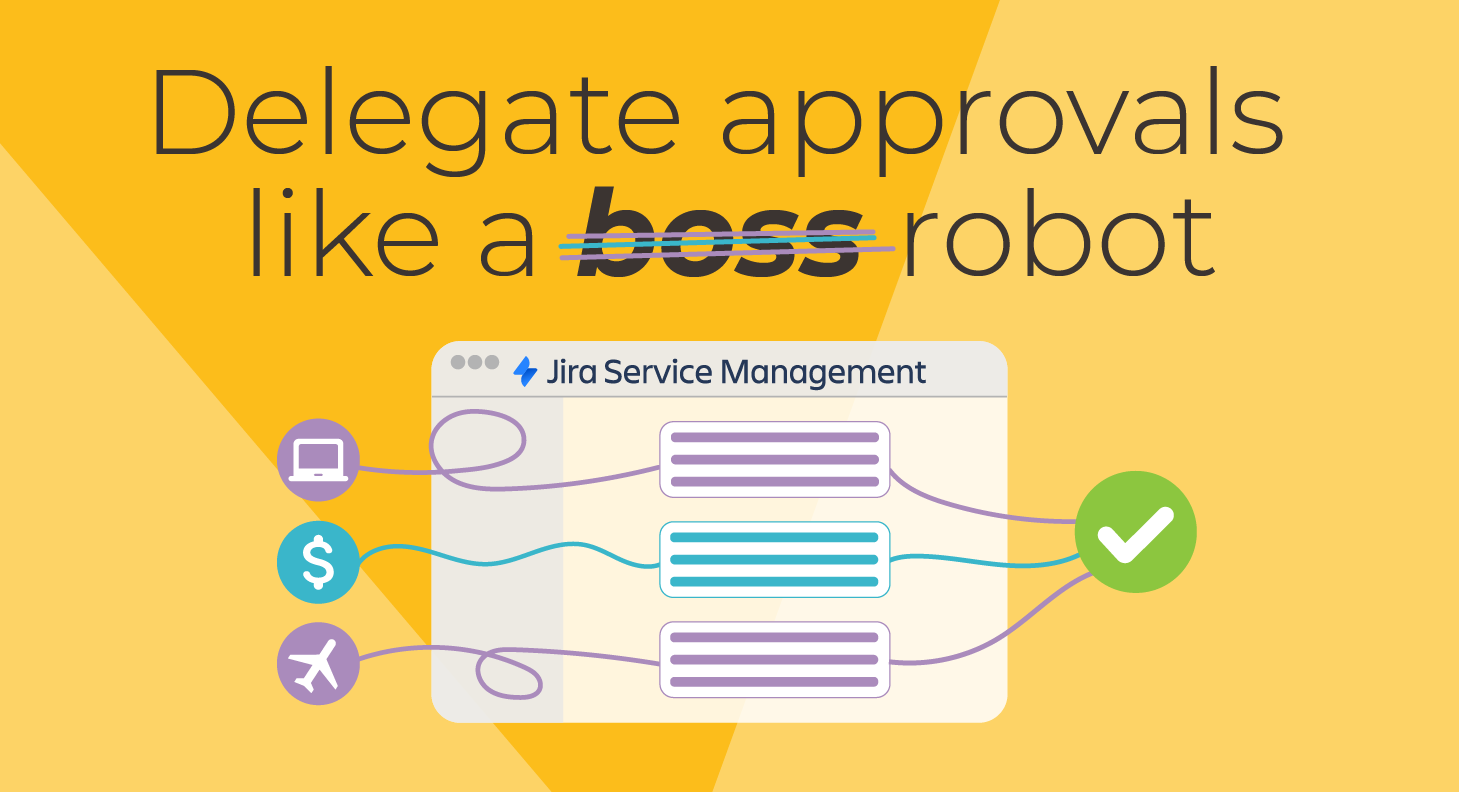Does your company rely on Jira Service Management Approvals?

Imagine that I make a request for time off and the approval is delayed. Yes, it’s a nuisance. I may not know if I’m allowed to make my travel arrangements, and it might be too late for me to travel altogether by the time the approval comes in. But altogether, the impact is only one unhappy employee.
While a single delay is not ideal, it’s a small pain from the perspective of the entire business. But what’s the potential damage to a company when approvals always come in too late? Ensuring that team approvals don’t transform into bottlenecks helps standardize governance and minimize workflow risks.
Setting Up Approvals in Jira Service Management
Setting up approvals in Jira Service Management is a straightforward process, but it requires a properly configured service project. To get started, navigate to your project settings and select “Request types.” From there, you can add an approval step to a workflow by choosing the “Add approval step” option. This allows you to configure various approval settings, such as assigning specific approvers and setting up approval rules. By carefully configuring these settings, you can ensure that your approval processes are efficient and effective, helping your team to manage requests seamlessly.
Adding an Approval Step to a Workflow
Adding an approval step to a workflow in Jira Service Management is a simple process that can significantly enhance your approval processes. Follow these steps to add an approval step:
- Navigate to Project settings and select Request types.
- Choose the request type you want to add an approval step to.
- Click on the Add approval step option.
- Select the approver field and choose the approvers you want to assign.
- Configure the approval rules, such as setting up specific conditions for approval.
- Click Save to save the changes.
By following these steps, you can easily integrate an approval step into your workflow, ensuring that all requests are properly reviewed and approved in a timely manner. This not only improves efficiency but also helps maintain high standards of service within your team.
5 types of unacceptable delays in approving requests

Here’s a quick list of requests that can put entire companies in danger if their approval arrives too late.
- Requests for new equipment or software needed to complete a time-sensitive project. In industries like manufacturing, construction, and engineering, the delay of the project can have severe financial and reputational consequences. Causing that delay because of a missing internal approval is hard to swallow.
- Requests for additional resources to address a technical issue that is affecting the organization’s operations. The criticality of this request will be obvious to technical leadership, particularly if the consequence of not approving it could imply the disruptions or downtime in critical systems. Unfortunately, VPs of Software Engineering don’t have the ear of the CEO just as much as the CFO or the VP of Sales for a key region, and it might be hard for them to fight for the budget required.
- Requests for training or development opportunities for team members. Less skilled employees are less productive, but trainings are often seen as a secondary activity that interrupts “business as usual”. I have seen them in a limbo quite often.
- Requests for travel and expenses for a business trip. This type of delay could make the team miss important meetings or events with customers. Translation? Some contracts may be lost to a faster competitor.
- Requests for new hire or contractor. Okay, we know that recruiting takes time, so the impact here is possibly less severe. However, the failure to land critical talent can damage and organization’s long-term plans and goals.
If you sum up all these “opportunities for being too slow” together, it should be clear pretty quickly that having a speedy process for approving requests is vital. So then, why do late approvals still happen?
Keep reading about Out Of Office
Reasons why approvals are not granted on time

Let’s assume that approvals are late as a rule. Otherwise, there may not be anything that needs fixing. Where should you start looking if you want to understand what’s wrong?
If certain fields are not visible to agents, a Jira administrator may need to intervene to check and enable these settings.
To simplify, let’s just say that there’s two basic options. Both are really common!
The Approval Process is too complex

If your organization is complex, it will have become a bureaucracy. And if that’s the case, having a request approved might escape the power of any isolated individual. Certain issues may require approval from a team member before they can progress to the next status, emphasizing the importance of structured approval processes.
Jira Service Management cuts the red tape
At some point, companies that are suffering because of too much internal red tape must admit that it’s time to change things, cut fat, go lean.
That’s why Jira Service Management has become a disruptive technology for many corporations: because it simplifies ITSM.

Sure, it’s still possible to create convoluted workflows with multiple approval steps in Jira Service Management. But at its core, the Approval functionality is minimalistic and effective.
Who’s guilty of delaying approvals in JSM?
So now, let’s imagine that we live in a perfect world where every company uses a simple approval config in Jira Service Management.
And… guess what? Some requests still take days or even weeks to be processed.
What the heck can be happening? I have a culprit: the overloaded approver
Approving Managers have become a bottleneck

There are actually many reasons why a manager who’s responsible for Jira approvals may not be able to deal with them.
- Drowning in requests. Sometimes managers are expected to approve too many requests… but it can feel like trying to swim through a sea of paperwork. This can happen very easily when an admin adds an individual approver in the workflow of a request type. If the request type becomes widely used, the backlog of requests may make the approval process stagnant.
- Low capacity. Being a manager is no walk in the park – it’s more like a marathon in heels! And requests that require a lot of meetings and decisions are just like that one hill that makes you want to quit.
- Approvers are missing in action. Do your processes account for situations where an approver is absent? And also for less likely scenarios where a delegate approver is also temporarily unavailable?
The solution: delegate Jira Service Management approvals

The factors above are often combined. Just like recruiters skimming through resumes, approvers are too often too busy to examine a request with the attention that it would deserve… not to mention dozens or hundreds of them! And their lack of availability also includes going on business trips, being offline on an overseas plane, or simply taking time off.
Regardless of the reason, automated approval delegation is the one-fits all solution to remedy bottlenecks.
How to delegate Jira Service Management approvals in relevant projects
The easiest way to automate approval delegations is through the approver coverer rules that can be built with Out of Office Assistant for Jira for Jira Service Management projects.
Note that this app can be used without the need for approvers to be actually on leave!
The rule below delegates approvals in the project Best International Service Desk to Andy Admin, the Approval Coverer.

Read more in the documentation: Delegating Approvals with Approver Coverers in Jira Service Management – Out of Office Assistant
Delegate JSM approvals based on the project
In the example above, only the requests in the project Best International Service Desk have their approval swapped to the Approval Coverer.
For every other JSM project, the owner of this rule will still be expected to handle incoming approvals directly.
Delegate every JSM approval
It’s also possible to delegate every approval across every JSM project. To set this up, simply select All projects in the project selection field. But be careful! This option may just move around the bottleneck without actually solving the problem.
How to make sure that delegated approvals work
Besides setting up the automation to delegate approvals in Jira Service Management, it’s very recommendable to train everybody: the playbook for approvers, delegate approvers, and requesters change quite a bit.
- Choosing delegates: It’s important to choose delegates who are qualified and capable. Considering factors such as knowledge, experience, and expertise!
- Set clear expectations and guidelines: Don’t give room for improvisation. Clear guidelines and expectations will help delegates handle their approvals. This may include providing training or resources to help them make informed decisions, and setting deadlines or other constraints to help ensure that approvals are handled in a timely manner.
- Monitor and review the delegation process: Ideally, delegate decisions will be as good as the original approver’s. But it might be the case that you’re sacrificing quality for the sake of speed. Everyone who is potentially impacted by the new system should know that so they can flag any issues.
- Communicate the new process: Be transparent about the new changes and their challenges to build confidence in the system and prevent disputes or complaints. This may involve providing regular updates and information on the status of delegated approvals.
Conclusion
With an effective delegation solution such as Out of Office Assistant for Jira, companies can become more efficient at their approval process and ensure that approvals are carried out on time. You will dramatically reduce any delays in getting approvals and make sure that no request ever goes unapproved.
But don’t forget the people factor! Software is not magic. Delegates will have to be trained and incentivated to solve the bottleneck that the current approvers are chocking on.








